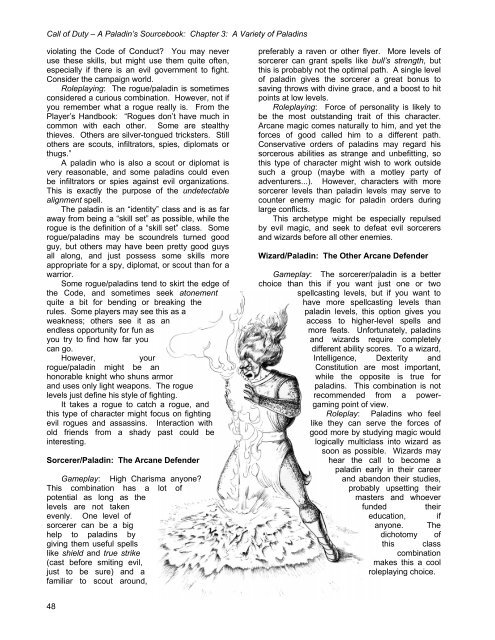DnD/Class Handbooks/Paladins/Call of Duty - Paladin
DnD/Class Handbooks/Paladins/Call of Duty - Paladin
DnD/Class Handbooks/Paladins/Call of Duty - Paladin
Create successful ePaper yourself
Turn your PDF publications into a flip-book with our unique Google optimized e-Paper software.
<strong>Call</strong> <strong>of</strong> <strong>Duty</strong> – A <strong>Paladin</strong>’s Sourcebook: Chapter 3: A Variety <strong>of</strong> <strong><strong>Paladin</strong>s</strong><br />
violating the Code <strong>of</strong> Conduct? You may never<br />
use these skills, but might use them quite <strong>of</strong>ten,<br />
especially if there is an evil government to fight.<br />
Consider the campaign world.<br />
Roleplaying: The rogue/paladin is sometimes<br />
considered a curious combination. However, not if<br />
you remember what a rogue really is. From the<br />
Player’s Handbook: “Rogues don’t have much in<br />
common with each other. Some are stealthy<br />
thieves. Others are silver-tongued tricksters. Still<br />
others are scouts, infiltrators, spies, diplomats or<br />
thugs.”<br />
A paladin who is also a scout or diplomat is<br />
very reasonable, and some paladins could even<br />
be infiltrators or spies against evil organizations.<br />
This is exactly the purpose <strong>of</strong> the undetectable<br />
alignment spell.<br />
The paladin is an “identity” class and is as far<br />
away from being a “skill set” as possible, while the<br />
rogue is the definition <strong>of</strong> a “skill set” class. Some<br />
rogue/paladins may be scoundrels turned good<br />
guy, but others may have been pretty good guys<br />
all along, and just possess some skills more<br />
appropriate for a spy, diplomat, or scout than for a<br />
warrior.<br />
Some rogue/paladins tend to skirt the edge <strong>of</strong><br />
the Code, and sometimes seek atonement<br />
quite a bit for bending or breaking the<br />
rules. Some players may see this as a<br />
weakness; others see it as an<br />
endless opportunity for fun as<br />
you try to find how far you<br />
can go.<br />
However, your<br />
rogue/paladin might be an<br />
honorable knight who shuns armor<br />
and uses only light weapons. The rogue<br />
levels just define his style <strong>of</strong> fighting.<br />
It takes a rogue to catch a rogue, and<br />
this type <strong>of</strong> character might focus on fighting<br />
evil rogues and assassins. Interaction with<br />
old friends from a shady past could be<br />
interesting.<br />
Sorcerer/<strong>Paladin</strong>: The Arcane Defender<br />
Gameplay: High Charisma anyone?<br />
This combination has a lot <strong>of</strong><br />
potential as long as the<br />
levels are not taken<br />
evenly. One level <strong>of</strong><br />
sorcerer can be a big<br />
help to paladins by<br />
giving them useful spells<br />
like shield and true strike<br />
(cast before smiting evil,<br />
just to be sure) and a<br />
familiar to scout around,<br />
48<br />
preferably a raven or other flyer. More levels <strong>of</strong><br />
sorcerer can grant spells like bull’s strength, but<br />
this is probably not the optimal path. A single level<br />
<strong>of</strong> paladin gives the sorcerer a great bonus to<br />
saving throws with divine grace, and a boost to hit<br />
points at low levels.<br />
Roleplaying: Force <strong>of</strong> personality is likely to<br />
be the most outstanding trait <strong>of</strong> this character.<br />
Arcane magic comes naturally to him, and yet the<br />
forces <strong>of</strong> good called him to a different path.<br />
Conservative orders <strong>of</strong> paladins may regard his<br />
sorcerous abilities as strange and unbefitting, so<br />
this type <strong>of</strong> character might wish to work outside<br />
such a group (maybe with a motley party <strong>of</strong><br />
adventurers...). However, characters with more<br />
sorcerer levels than paladin levels may serve to<br />
counter enemy magic for paladin orders during<br />
large conflicts.<br />
This archetype might be especially repulsed<br />
by evil magic, and seek to defeat evil sorcerers<br />
and wizards before all other enemies.<br />
Wizard/<strong>Paladin</strong>: The Other Arcane Defender<br />
Gameplay: The sorcerer/paladin is a better<br />
choice than this if you want just one or two<br />
spellcasting levels, but if you want to<br />
have more spellcasting levels than<br />
paladin levels, this option gives you<br />
access to higher-level spells and<br />
more feats. Unfortunately, paladins<br />
and wizards require completely<br />
different ability scores. To a wizard,<br />
Intelligence, Dexterity and<br />
Constitution are most important,<br />
while the opposite is true for<br />
paladins. This combination is not<br />
recommended from a powergaming<br />
point <strong>of</strong> view.<br />
Roleplay: <strong><strong>Paladin</strong>s</strong> who feel<br />
like they can serve the forces <strong>of</strong><br />
good more by studying magic would<br />
logically multiclass into wizard as<br />
soon as possible. Wizards may<br />
hear the call to become a<br />
paladin early in their career<br />
and abandon their studies,<br />
probably upsetting their<br />
masters and whoever<br />
funded their<br />
education, if<br />
anyone. The<br />
dichotomy <strong>of</strong><br />
this class<br />
combination<br />
makes this a cool<br />
roleplaying choice.


